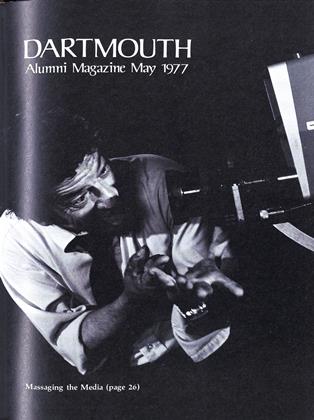The Dartmouth College Weekly Calendar is published on paper of various shades of yellow, orange, green, and goldenrod, and is distributed through the college postal system every Thursday afternoon. Occasionally, in a mood of cultural bonhomie, we peruse the calendar in quest of enlightenment. One listing we've frequently noticed, for instance, is the "New Canaan Academy Meditation" which is scheduled for Monday, Wednesday, Friday at 7:00 a.m. in College Hall. What is the New Canaan Academy? Why do its members meditate together? Why do they meditate together in College Hall? Unfortunately, at 7:00 in the morning we are usually asleep, and we have never-found out about the New Canaan Academy Meditation. Then there was this listing last term, an offering of the Comparative Literature Department: Professor Dante Delia Terza of Harvard, "Dante and the French Culture: A Reading of Inferno, Canto XV." There was also this, for anyone interested: Professor Ronald A. Hites of M.I.T., on "Gas Chromatographic Mass Spectrometry...."
But it took a colleague of ours to point out the enigmatic: "Go Club Meeting. Beginners Welcome." The "Beginners Welcome' had a particular appeal - we are beginners at almost everything - but, we wondered, what is a Go? We looked up Go, the noun, in the dictionary: "A Japanese game for two, played with counters on a board divided into 361 squares. I hat Wednesday night, we went to the Go club meeting in the Mathematics Department lounge. (Go, we later learned, appeals to people interested in math.) Since we alone arrived punctually, we had time to leaf through a 30-month-old issue of The American Go Journal, published by the American Go Association, which gave tips, such as "Sometimes Go must be played with rhythm," and contained news about the Penn State Open, sponsored by the Delaware Valley Go Association.
A member of the club named Bill finally arrived. Bill told me that anywhere from two to ten people had been showing up for Go, but that attendance had been falling off since the meetings were moved from Friday nights to Wednesday nights. Jim and Andy soon arrived, along with a reporter from The Dartmouth named Mary Heslin, who had a notepad and a pencil and wanted to know our names and what class we were in because the D had a policy of identifying people by their class. "Oh good, some publicity," said Andy, an officious sort of chap who soon after leaned over to examine Mary Heslin's notes, and said, "Did you get the time and the day of our meeting?" "This doesn't make sense to you, but it does to me," said Mary Heslin, defending the accuracy of her notes. "Do you find there is much interest in Go at Dartmouth?" she asked the three club members, none of whom was an undergraduate. "This is not to be quoted," replied Andy, before answering. "How did you hear about Go? Did you know anything about it before you came?" Mary Heslin asked us. Our response, as recorded in The Dartmouth: "A friend pointed out its existence in the Weekly Calendar."
Meanwhile, Bill and Jim had poured themselves coffee and had started up a game. A typical game takes about an hour and 15 minutes to play. Bill gave Jim a three-stone handicap, but Jim was the most style-conscious player of the two, handling the stones between his fingers and then flipping his wrist to slap the stones down on the board. The more force you use to slap the stone down, he said, the more serious the move. A Go board has many more squares than a chess board, but otherwise looks like a chess board - Go, I was told, is a member of the "chess family." "Go," said Jim between plays, "is the game of the Japanese, just like chess is the game of the Russians." The stones used are identical, although Jim said that the black stones have a different texture than the white stones have. Go players use words like Atari, Ko, and eye to describe various game situations. The game is won by points which are won by surrounding areas of the board or by surrounding stones of the opponent, and ends by agreement when one of the players resigns or no more moves are possible. In this game, Bill surrounded a large area of Jim's stones, and Jim resigned.
We asked Jim how he came upon Go. He showed me a book he was carrying entitled The Game of Go: The NationalGame of Japan, by a man named Lewis, and said, "I picked this up 15 years ago while I was in college, and brought it back and taught my roommate how to play." He pointed to the game board. "I bought the game set in Minneapolis in a department store in 1964 for $19." We inquired whether Go is a sport. "Is chess a sport?" someone rejoined. We thought we'd seen articles about chess in Sports Illustrated. "That's a definition!" said my interlocutor. "If Sports Illustrated covers chess, well, I guess Go's a sport, then." Bill talked knowingly about handicaps. "You as a beginner would receive a nine-stone handicap, and probably, if we played a dozen games, I would have difficulty beating you. If I had a nine-stone handicap, I could probably compete with the best amateur in the world. I played Jim and gave him three stones. The handicap makes for close, hard-fought games." At this point we had to depart, in order to dive deep into the mysteries of Moby Dick. "See you next week," said Andy.
 View Full Issue
View Full Issue
More From This Issue
-
 Feature
FeatureWomen at the Top (almost)
May 1977 By SHELBY GRANTHAM -
 Feature
FeatureOISER: Massaging the Media
May 1977 By PIERRE KIRCH -
 Feature
FeatureNatural Energy Resource
May 1977 -
 Feature
FeatureGold-Medal Equestrian
May 1977 By M.B.R. -
 Article
ArticleWar
May 1977 By JACK DEGANGE -
 Article
ArticlePaddler, Climber, 4-term Planner
May 1977 By D.M.N.







